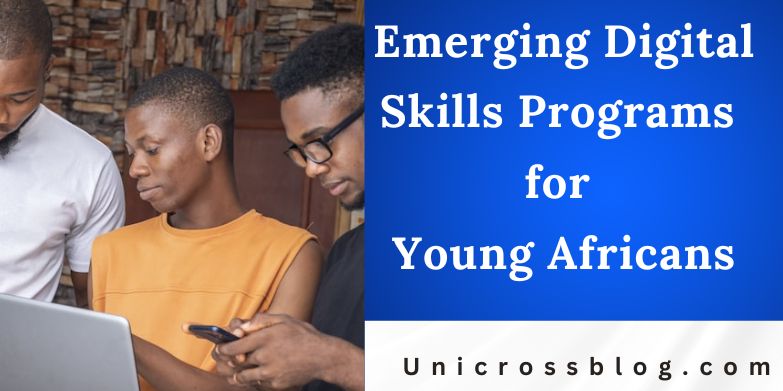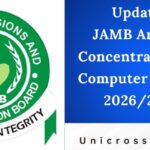Africa stands at the cusp of a digital revolution, where rapid technological advancements promise to reshape economies, societies, and opportunities for its youngest generation. With over 60 percent of the continent’s population under the age of 25, Africa’s youth represent a dynamic force capable of driving innovation and sustainable development. Yet, this potential remains largely untapped due to a persistent digital skills gap.
Emerging digital skills programs are emerging as vital bridges, equipping young Africans with the tools to navigate an increasingly tech-driven world. These initiatives focus on foundational literacy, advanced competencies like artificial intelligence and cybersecurity, and entrepreneurial skills, fostering not just employability but also the creation of new jobs and solutions tailored to African challenges.

The Need for Digital Skills
The urgency is clear. By 2030, the International Labour Organization estimates that 230 million digital jobs could emerge across Africa, spanning sectors from e-commerce to fintech and renewable energy tech. However, a joint African Union and UNESCO study highlights that only 10 to 15 percent of young people currently access structured digital education, with fewer than 5 percent trained in high-demand areas like programming or data analysis. This disparity risks leaving millions behind in a global economy where nine out of ten jobs will require digital proficiency. In response, governments, international organizations, tech giants, and local innovators are launching targeted programs that prioritize inclusivity, scalability, and relevance to local contexts.
Key Emerging Digital Skills Programs
Several programs have gained momentum in recent years, blending global expertise with African-centric approaches. They emphasize practical training, mentorship, and integration with local industries, ensuring participants can apply skills immediately.
1. Google’s Digital Skills for Africa
Google’s Digital Skills for Africa initiative, launched in 2016 and expanded significantly by 2024, exemplifies scalable impact. It has trained over 10 million young people across the continent in essential digital competencies, including online safety, content creation, and basic coding. In countries like Nigeria, Kenya, and South Africa, the program partners with local hubs to deliver free workshops and certifications, focusing on underserved communities. By 2025, it aims to reach an additional 5 million learners through mobile-first modules, addressing barriers like limited internet access with offline resources. Participants often report improved job prospects, with many securing roles in digital marketing or remote freelancing platforms.
2. Mastercard Foundation’s Africa Fintech Ventures
The Mastercard Foundation’s Africa Fintech Ventures (AFV) program takes an entrepreneurial angle, targeting aspiring innovators in the digital economy. Since 2023, AFV has supported over 5,000 young Africans via a digital learning platform that teaches venture design, AI ethics, and fintech basics. In 2024, it launched the Africa Youth Employment Clock, a data tool forecasting job trends in tech sectors, helping users align skills with market needs. The program culminates in pitch competitions, where cohorts from Rwanda to Ghana develop prototypes for solutions like mobile payment apps for rural farmers. Early outcomes show a 40 percent increase in startup funding for graduates, underscoring its role in building Africa’s tech ecosystem.
3. World Bank’s IDEA Program
On the policy front, the World Bank’s Inclusive Digitalization in Eastern and Southern Africa (IDEA) Program, approved in 2024, targets 180 million beneficiaries by 2032. It invests in infrastructure while prioritizing skills training, such as TechHubs in Malawi that have upskilled 19,000 youth in data analytics and web development as of mid-2025. Similarly, Malawi’s Digital Foundations Project has connected 84,000 students to educational internet and funded coding bootcamps, reducing urban-rural divides. These efforts integrate with national curricula, ensuring long-term sustainability.
4. EDISON Alliance and Regional Efforts
The World Economic Forum’s EDISON Alliance, initiated in 2021, accelerates digital inclusion through public-private partnerships. By 2025, it has connected over 1 billion people globally to services in education and finance, with a strong African focus. In alignment with the African Union’s Decade of Accelerated Action for education (declared in 2024), EDISON supports AI literacy programs in native languages, reaching remote learners in nations like Ethiopia and Senegal. A youth-focused session at the 2025 Global AI Summit in Kigali highlighted how such training empowers innovators to adapt emerging tech for local issues, like climate-resilient agriculture apps.
5. Specialized and Corporate-Led Initiatives
Specialized initiatives address niche needs. The Smart Africa Digital Academy, backed by the pan-African Smart Africa alliance, trains thousands in cybersecurity and digital governance by 2026, with bootcamps for young women in Uganda, Rwanda, Ghana, and Nigeria. MTN’s complementary efforts emphasize gender equity, training over 2,000 females annually in mobile app development. In health tech, the AfricaCDC Youth Digital Health Champions (Y-DHC) Program, now in its 2025 cohort, profiles 50 emerging leaders to build digital tools for disease surveillance, blending coding with public health knowledge.
Corporate-led programs like McKinsey’s Forward Learning, a five-month online journey, equip 1,000 young professionals yearly with leadership and digital skills through case studies and virtual workshops. Graduates earn badges and join global networks, facilitating cross-border opportunities. Meanwhile, Talent 4 Startups, a 2024-2025 initiative, has upskilled 280 students in AI and machine learning, aiming for 1,000 more via industry ties, directly feeding Africa’s burgeoning startup scene.
6. Regional TVET Framework
Regionally, East Africa’s Regional TVET Qualifications Framework mainstreams digital modules into vocational training, standardizing skills like blockchain across borders. This supports Agenda 2063’s digital education pillar, countering “jobless growth” by creating pathways to decent work.
Impacts and Future Prospects
These programs are yielding tangible results. In 2024, International Youth Day’s theme, “From Clicks to Progress: Youth Digital Pathways for Sustainable Development,” spotlighted how reskilling in AI and data has boosted employability by 25 percent for participants in hubs like Nigeria’s Andela or Kenya’s iHub. Broader economic ripple effects include a projected $120 billion in revenue from digital B2B opportunities in sub-Saharan Africa, per the IFC, contingent on skilled workforces.
READ ALSO: Top 10 NGO Programs for African Youths in 2025
FAQs
What are the main skills taught in these programs?
Most programs cover foundational digital literacy, such as internet navigation and content creation, alongside advanced topics like coding, AI, data analysis, cybersecurity, and fintech. They emphasize practical applications, like building apps for local problems.
Who can participate in these programs?
Eligibility varies, but most target Africans aged 18-35, including students, unemployed youth, and early-career professionals. Many prioritize women, rural residents, and those from low-income backgrounds, with free or low-cost access.
Are these programs free?
Yes, many are fully funded, like Google’s and Mastercard’s initiatives. Others offer scholarships or subsidies, though some corporate programs may charge nominal fees offset by certifications.
How do I apply?
Applications typically open annually via program websites or partners. Prepare a CV, motivation letter, and proof of eligibility. Deadlines range from September to December for 2025 cohorts.
What career opportunities arise from these programs?
Graduates often land roles in tech startups, freelancing on platforms like Upwork, or digital roles in finance and health. Many launch ventures, with success rates boosted by mentorship networks.
How do these programs address Africa’s unique challenges?
They incorporate local languages, offline modules, and context-specific projects, like solar-powered training in off-grid areas, ensuring relevance to issues like agriculture tech or mobile money.
READ ALSO: Benefits of Joining African Union Youth Volunteer Corps
FAQs
What are the main skills taught in these programs?
Most programs cover foundational digital literacy, such as internet navigation and content creation, alongside advanced topics like coding, AI, data analysis, cybersecurity, and fintech. They emphasize practical applications, like building apps for local problems.
Who can participate in these programs?
Eligibility varies, but most target Africans aged 18-35, including students, unemployed youth, and early-career professionals. Many prioritize women, rural residents, and those from low-income backgrounds, with free or low-cost access.
Are these programs free?
Yes, many are fully funded, like Google’s and Mastercard’s initiatives. Others offer scholarships or subsidies, though some corporate programs may charge nominal fees offset by certifications.
How do I apply?
Applications typically open annually via program websites or partners. Prepare a CV, motivation letter, and proof of eligibility. Deadlines range from September to December for 2025 cohorts.
What career opportunities arise from these programs?
Graduates often land roles in tech startups, freelancing on platforms like Upwork, or digital roles in finance and health. Many launch ventures, with success rates boosted by mentorship networks.
How do these programs address Africa’s unique challenges?
They incorporate local languages, offline modules, and context-specific projects, like solar-powered training in off-grid areas, ensuring relevance to issues like agriculture tech or mobile money.







